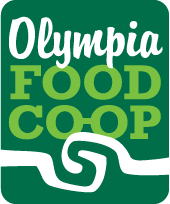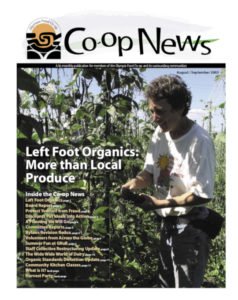Co-op News August & September 2005 PDF
LEFT FOOD ORGANICS: MORE THAN LOCAL PRODUCE
Do you ever wonder where those robust heads of lettuce, spicy bunches of mustard greens, and deliciously crunchy bundles of bok choy come from? Have you noticed that these items are often locally grown and delivered to the Co-op fresh from the farm to our cooling racks? Here at the Co-op we spend a great deal of time collaborating with local growers and producers to make good food accessible to more people while supporting local production. One such farm is Left Foot Organics.
It was a cool, cloudy June day when we set out to meet the staff and growers of Left Foot Organics. Situated on an old dairy farm fifteen minutes south of Olympia, Left Foot Organics is bringing inspiration and tasty organic food to the people of the region. Founded in 2001 by veteran USDA agricultural economist Ann Vandeman, Left Food set itself apart from most market farms. Whereas most local organic farms in the region are for profit, Left Foot is a registered 201(c)3 not for profit venture. The individuals here strive to produce high quality produce for their CSA subscribers and market customers, in addition to “providing employment and life skills training to people with disabilities and to use these activities as a means of educating the public about people with disabilities and the need for inclusion.”
With little more than two acres currently in production, and 10 – 12 developmentally disabled growers on staff, the folks out here are busy planting, weeding, tending, and harvesting over fifty varieties of vegetables. They have now ventured into growing vegetable starts and perennial crops as well. Left Foot’s success is largely attributable to the dedicated and spirited folks who work their hoes and shovels where their good intentions lead them. Vandeman would likely agree that none of this would have been possible without the generous support of local businesses, farmers, unions, volunteers, community members, friends, a caring staff, and the dedicated growers who work the land daily. Left Foot is a reminder that people with disabilities are often overlooked and undervalued in our culture. Very few businesses truly embrace the opportunity to work with the developmentally disabled and even fewer actually take up the arduous task of equipping them with the tools they will need to succeed. At Left Foot, the development and growth of the individual is as important as that of the plants in their care. Vandeman states that “we want the community that these folks work in to be welcoming them — in employment, in school, in social life — and so we’re creating that kind of environment here on the farm where everybody is working together toward common goals and contributing to the best of their abilities.”
This goal is achieved in a variety of ways. One way is through programs such as Growing Partners, a collaborative endeavor with Children and Youth Services, which attempts to model inclusive community development by fostering relationships with typically developing youth and developmentally disabled youth. The hope is that the youth will take the knowledge, skills, and compassion they gain in the program with them throughout their lives. This relationship can help break down the pressures of peer modeling and provide a safe space for people with developmental disabilities to feel integrated and supported. Inclusion is key to this work because people with developmental disabilities often communicate differently, sometimes non verbally, and without an inclusive environment, they are shut out and alienated.
As we walk amongst the rocky, weedy fields of lettuce, basil, cabbage, and other sundry offerings I begin to feel my body relax. Suddenly the cars passing nearby are less noticeable, and the sound of Ann’s voice is more audible. I even reach down and start pulling weeds from the parsley as Ann introduces us to Heide, one of Left Foot’s oldest growers and best friends. Heide loves the farm and is clearly proficient in her work. Where she was once very shy and in need of a great deal of one on one coaching, she now works independently and steadily.
You can find Left Foot certified organic produce at the farm stand on Case Road, the Co-op, the OlySunday Market in downtown, at both the Proctor and downtown Tacoma farmer’s markets, Bayview, and Ralph’s Thriftway. If you are interested in volunteering with Left Foot, give Kristin Ohler, AmeriCorps volunteer coordinator, a call. Contributions can be made in person at the farm or online at leftfootorganics.org. All contributions are tax deductible and, in some cases, come with a gift.
By Kim Langston and Erin Majors, staff members
Co-op News August & September 2005 PDF

